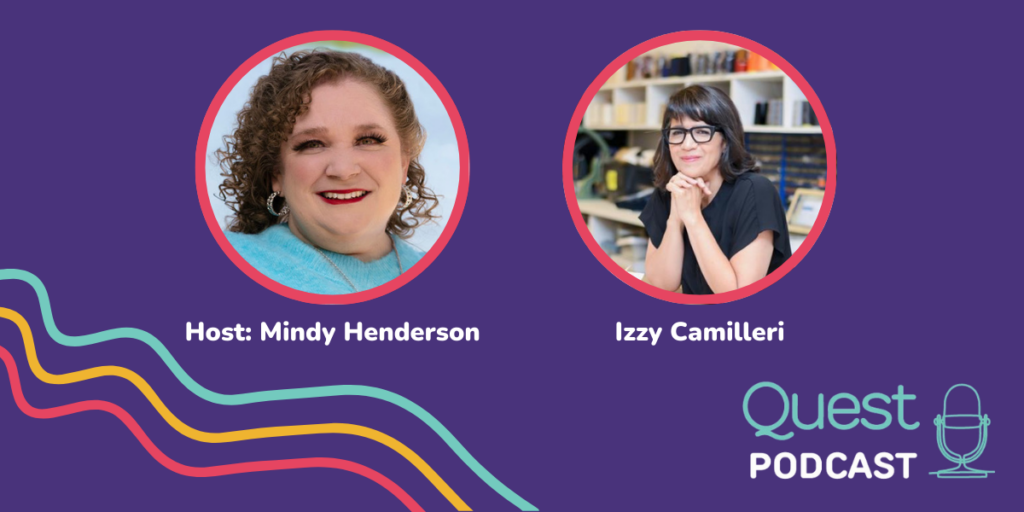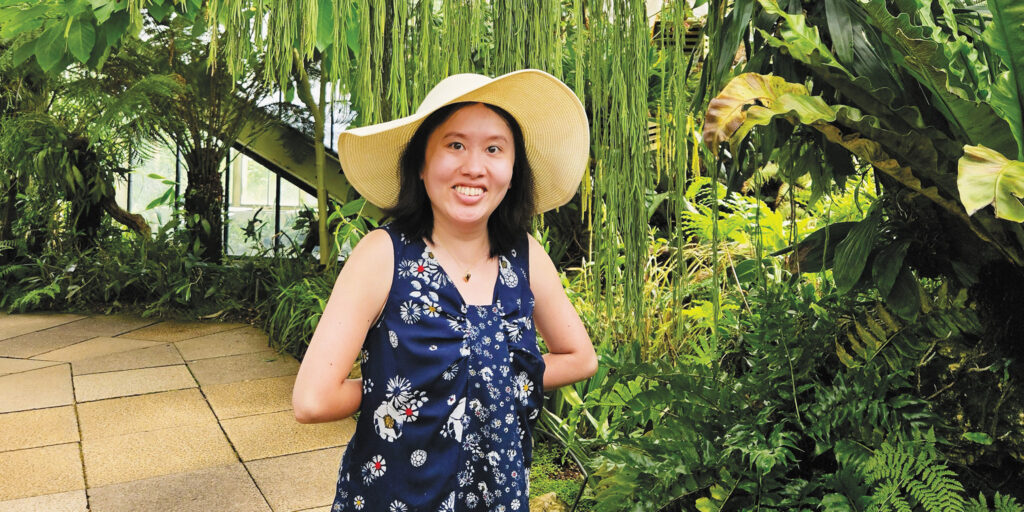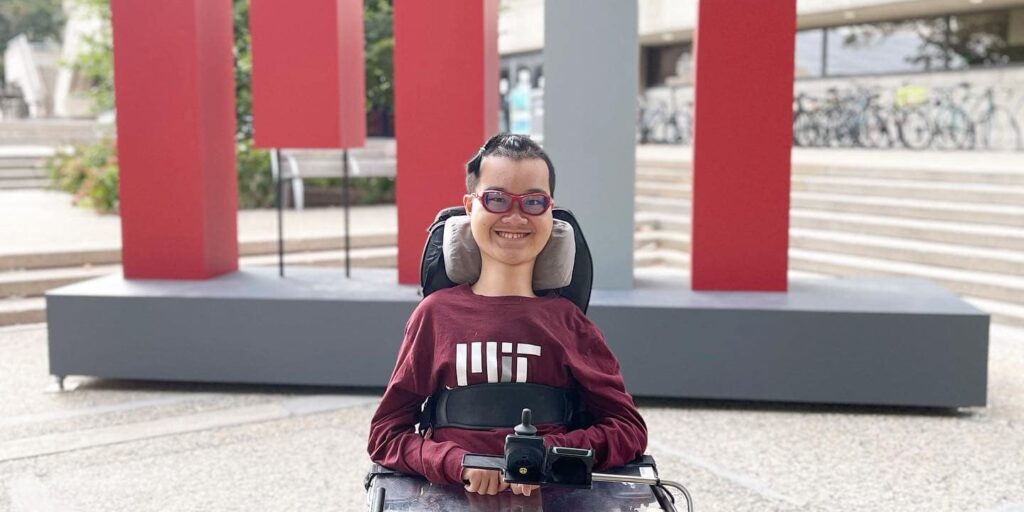
MIT Student is a Shining Star in the Universe
By Rebecca Hume | Tuesday, August 13, 2024
5 Second Summary
Read more personal stories from members of the neuromuscular community about their College Experience as they share their journey, accomplishments, advice for accommodations and overcoming barriers, and insights into navigating college life with a disability.
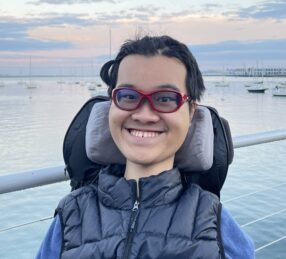
Ben Lou
Ben Lou is breaking boundaries in quantum physics, mathematics, and philosophy – and in the way that the world views people living with disabilities. The rising senior at MIT has gained notoriety after his viral acceptance speech during the 2023 Alibaba Global Mathematics Competition in Beijing, China. Competing against 50,000 mathematicians worldwide, Ben placed in the top 70 at this prestigious competition. In his acceptance speech, he shined light on what it is like to live with spinal muscular atrophy (SMA) and shared poignant words of empowerment and ambition for others living with disabilities.
“Society might expect that due to your disability, you won’t be able to accomplish at the same level as the able-bodied. Brush that thought aside,” Ben says. “The universe’s most profound melodies are perceived not by our limbs, but by our spirit and intellect.”
Whether studying theories of quantum gravity, speculating on the deep philosophical questions of what it means to be oneself, or developing novel assistive technology, Ben’s aspirations are leading to projects that can change the future.
A passion for understanding the universe’s greatest questions
For as long as he can remember, Ben has been intrigued by the most fundamental questions of the universe. That intrigue led the now 21-year-old college senior to pursue his goal of finding answers to those questions by double majoring in math and physics, with a minor in philosophy, at MIT. He credits his passion, curiosity, perseverance, patience, and the support of those around him, especially his mother, for the success he continues to achieve on his journey to understand life and the world around us.
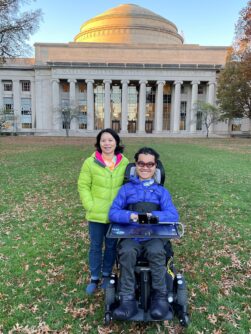
Ben and his mom, Jenny Huang
“Early on, I set a goal to understand the secrets of the universe,” he says. “Life, this world, reality – it’s all so full of intriguing mystery and order, and I just have to understand it all. That is why I’m studying math, physics, and philosophy, which all provide their own complementary perspectives on these mysteries. A critical aspect of understanding profound truths is perseverance. These truths do not reveal themselves easily.”
Ben began his life’s goal of diving into the long and intricate arguments and subtleties of the universe during his early education, studying the great thinkers of philosophy, math, and physics and building an immense knowledge base by absorbing the life’s works of the world’s great minds. His mother, Jenny Huang, homeschooled Ben and also enrolled him in a shortened schedule at his local school, where he attended for a few hours each week to increase social interaction. As his primary caregiver, Jenny provides assistance with his daily tasks like eating, dressing, bathing, and using the restroom. Ben was diagnosed with SMA around the age of one year old. He used a special brace to help him sit up when he was younger and he has never been able to bear weight, stand, or walk. He uses a power wheelchair and assistive technology in his daily life and studies. For Ben, mathematics and physics have allowed him to transcend the physical limitations of his body.
“Even as my muscles deteriorated, my thirst for understanding the world only deepened,” Ben says. “Although I have never taken a physical step in this world, in the rich and magnificent cosmos of mathematics, I soar. If I can understand the language of the universe, why should I worry about my physical limitations?”
A rising star and bright future
Ben chose to attend MIT due to its reputation as a renowned leader in math and physics. He worked with his academic advisor Janet Conrad and the Disability and Accessibility Services (DAS) at MIT and Annie Tulkin at Accessible College to navigate college accommodations and strategies for managing coursework. One of those strategies included approval to live in graduate housing as an undergrad so that Jenny could accompany him to college and continue to serve as his caregiver. The school also allowed Ben’s nurse, who travels with him from Boston and resides on campus during the school year, to rent a unit in graduate housing. Ben uses scribing services and Dragon Naturally Speaking software for his classes and for his research.
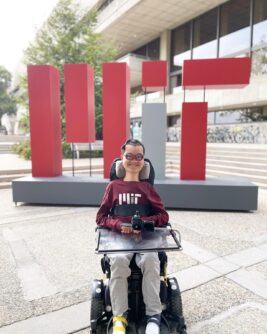
Ben at MIT
Now entering his senior year, Ben carries a perfect GPA and is currently working on two exciting research projects. In physics, he is theorizing new ways to obtain ultimate precision quantum-enhanced measurements by using arrays of laser beams in an interferometer. He hopes that this increased accuracy of measurements will ultimately enhance our understanding of the interplay between quantum mechanics and gravity. In his mathematical research, Ben is studying how particle spin might behave if our reality based on complex numbers were instead based on a different number system in which adding 1 to itself many times could equal 0. He hopes this research will ultimately create a deeper understanding of the mathematical theory of our reality by also understanding potential alternate scenarios.
As a side passion project, Ben is also working on an assistive technology project to design an innovative and effective self-feeding device for those living with disabilities. With his team at MIT, Ben has developed a prototype with the potential to revolutionize how people with disabilities feed themselves. The device consists of an arm that can pick up specially designed food-holding containers and bring the container to the individual’s mouth. There is a mechanism inside the container that pushes food through an opening into the mouth at the press of a button, allowing the user to control bite size and avoid spilling. Ben believes that, compared to current devices on the market which all utilize spoons, his device works with a much wider array of foods and is significantly more accessible to users like himself who have limited muscle strength. He plans to present his prototype this fall.
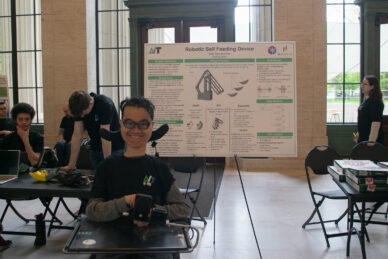
Ben with his feeding device design at the MIT Assistive Technology Spring Showcase
Ben recently earned the 2024-2025 Goldwater Scholarship, a prestigious grant awarded to the most promising young researchers in their field. As he pursues his passions, he is also using his success to advocate for inclusion and to empower others. He was recently interviewed on the nationally broadcasted Dan Abrams Show, where he shared his experiences and an important message.
“I hope I shared a message of motivation to be determined to make the best out of the short time we have in this life,” Ben says. “It is too easy to start doing only the things that bring you happiness in the moment, instead of focusing on the dreams that will truly fulfill you in the long term. I hope I can serve as a reminder of what we all can accomplish, disability or not, if we ground ourselves in our values and focus on what is most important.”
For Ben, the endless possibility of discovery in his field of study and the profound impact those discoveries can have on our understanding of the universe serve as his driving force. His future goals include becoming a professor of fundamental physics and contributing as an advisor to assistive technology companies working on affordable, revolutionary solutions to enhance the independence of those living with disabilities. He also aims to become a philanthropist, supporting organizations that do life-changing work for those with rare disease and those living in poverty.
Advice to others
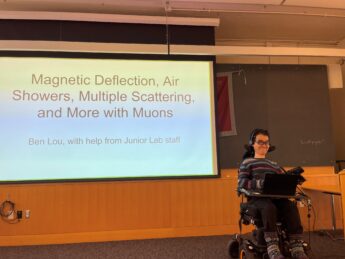
Ben presenting in the classroom at MIT
Ben advises others to question the world around them and to pursue their passions with perseverance despite any barriers they might face. “You need to find the project, the endeavor, the dream that you can truly be proud of when you are old and looking back at your life,” he says. “Play to your strengths. There are going to be roadblocks and prejudice standing against you, but if you work hard enough and make your prowess glaringly obvious, you can overcome these. You need to be determined to creatively seize your opportunities and work hard. Of course, this applies to people who don’t have disabilities, but I do think that, unfortunately, it is especially paramount that we with disabilities pursue our passions with impeccable form, because the playing field is most certainly not level.”
Albeit an unlevel playing field at times, Ben has found that identifying his passion and devoting his life to it has brought him immense success and satisfaction. He believes that the key to success is recognizing that the vast array of interesting and worthwhile subjects of study in the world surrounding us offers infinite opportunities to everyone. He advises others to dig deeply and identify what is truly interesting and meaningful to them.
“Question everything around you,” he says. “We do this all the time in physics, but really, it is a way of living. If you really master the ability to question everything, you will become a great thinker and live a more fulfilling life. Most profoundly, ask yourself why you are alive. That is a question that will lead to aligning your life with your deepest values and passions.”
Next Steps and Useful Resources
- Watch Ben’s acceptance speech at 2023 Alibaba Global Mathematics Competition in Beijing.
- Watch Ben’s recent interview on Spectrum News.
- Stay up-to-date on Quest content! Subscribe to Quest Magazine and Newsletter.
Disclaimer: No content on this site should ever be used as a substitute for direct medical advice from your doctor or other qualified clinician.


